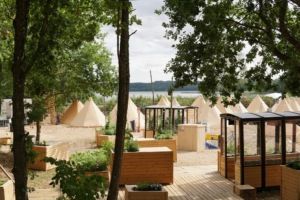News
A Danish cup of Joe? Northern Europe’s first coffee farm heading for Denmark
This article is more than 7 years old.
Peter Larsen Kaffe hopes to develop a stronger bean to reach better potential

The future of coffee production? (photo: Peter Larsen Kaffe)
Denmark might be among the countries in the world where people drink most coffee per capita, but it’s certainly not a place one would associate with producing coffee. But that may change in the not too distant future.
Peter Larsen Kaffe aims to become the first coffee farm in northern Europe, launching this week at Skanderborg Festival with two greenhouses that initially hopes to function as a development centre.
“With this farm we will take new paths and show the massive potential of coffee beans. Coffee contains a high nutritional value in the form of protein, antioxidants and vitamins, which is not currently being utilised,” said Lars Aaen Thogersen, the head of development and communication at Peter Larsen Kaffe.
READ MORE: Copenhagen the second most expensive city in the world to drink coffee
More than a drink
Thogersen also said that experts contend that we only use about 3-5 percent of the potential nutritional value of the coffee bean today – something that the Danish farm wants to significantly improve.
The Danish farm hopes to develop into a small production of Danish coffee in 3-5 years and that the project will also serve as a potential safeguard in the face of the threats of climate change – it is estimated that 50 percent of the world’s coffee-growing areas will have vanished in 30 years’ time.
“We must look at the raw material with fresh eyes. By fermenting and exploiting all the natural resources in the beans we can create new bio-cultural products like kefir, snacks, beer and other food produce. We need to create new products from a well-known plant and optimise the utilisation of the abundant resources that the biomass contains. And by the way – the coffee grounds also work extremely well as fertiliser for other natural products.”
Peter Larsen Kaffe is under no illusion that it can create coffee of superior quality to that found in traditional coffee-producing regions like Brazil or Ethiopia, but it believes it can develop new products from the coffee plant. The company has already experimented with coffee beer, coffee tonic and kefir.










































